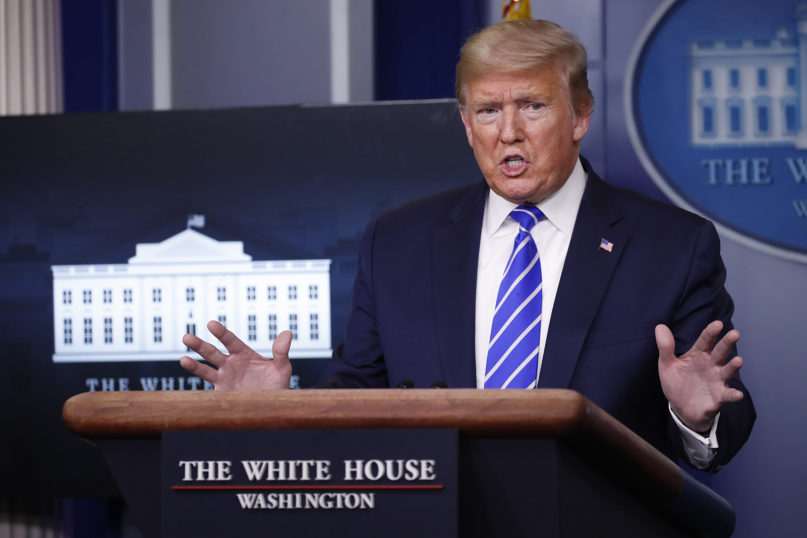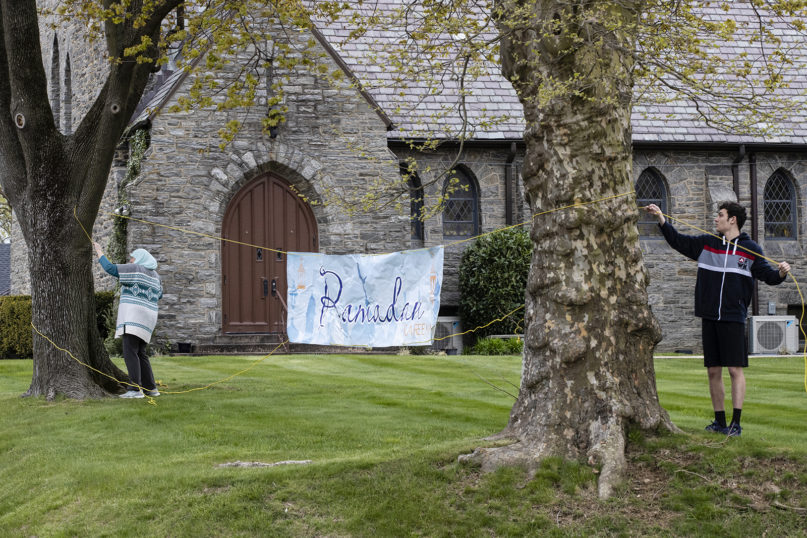(RNS) — How Muslim Americans celebrate Ramadan this year will be different. We will not share meals with loved ones outside our homes; we won’t gather for prayer at mosques; we won’t have the joy of late-night social gatherings. We will fast and break fast, secluded in our homes, for a full month.
But one thing remains the same this Ramadan: the bigotry our community faces from the president of the United States.
Just days before our holy month of fasting and prayer began, President Trump retweeted “Let’s see if authorities enforce the social distancing orders for mosques during Ramadan (April 23 – May 23) like they did churches during Easter.”
Faced with the fallout from his lack of action to stop the spread of the coronavirus, he instead chose to divert attention to minority communities with fear mongering and division.
The ludicrous attempt to politicize bans on religious gatherings ignores the fact that in approximately 20 states religious gatherings were exempted from statewide stay-at-home orders and that for the most part churches closed voluntarily. According to a survey by the Public Religion Research Institute (PRRI), just 3% of churchgoers said they planned to attend in-person Easter services. A substantial majority (77%) of all Americans, meanwhile, opposed the religious exemptions, for which there is, after all, no public health rationale.
Those few houses of worship that refused to accept the deadliness of the coronavirus were following Trump’s lead. The president repeatedly downplayed concerns about the coronavirus, even after the pandemic began to spread in our country. Law enforcement officials who enforced stay-at-home orders in churches did so to protect our public health.
Sadly, several coronavirus outbreaks can be traced back to those houses of worship that decided to meet.
Yet when asked about his retweet of the comment about mosques, Trump defended it, saying, “They go after Christian churches, but they don’t tend to go after mosques.” He also took the opportunity to include an unrelated attack on Rep. Ilhan Omar, as if to justify his bigotry against Muslims.

President Donald Trump speaks in the James Brady Press Briefing Room of the White House, Thursday, April 23, 2020, in Washington. (AP Photo/Alex Brandon)
After almost four years of Trump’s presidency, we recognize this page of his playbook: He has found that the best way to keep attention away from his poor decision-making is to shift blame and attention to someone else, and the easiest way to do that is to tap into people’s fears and prejudices. Let’s be sure to keep the focus where it belongs.
We will adapt to social distancing this Ramadan because it is the most important act of worship we can do. What better way to follow our religion than to participate in an effort to save lives? The Fiqh Council of North America, a body of Islamic scholars in the U.S., issued multiple statements reminding Muslims of Islamic teachings specifically related to plagues and urging adherence to CDC guidance. The National Muslim Task Force on COVID-19, made up of 39 Muslim organizations, declared: “Muslim community centers and places of worship should suspend all social and educational events and gatherings.”
Trump’s response to this pandemic, on the other hand, has already cost people their lives. The United States now has more confirmed cases of the coronavirus than any other country in the world. As of today, at least 46,000 Americans have died from it.
Muslims will continue serving on the front lines. In New York City alone, Muslims comprise 9% of all medical doctors — many of whom continue to work even without the personal protective equipment the Trump administration has failed to provide in sufficient amounts.
This Ramadan will be different not just because we Muslims are in isolation, but because we will be in mourning. Many of us will have lost loved ones, many of us are endangered by our jobs, and many of us are mourning in anticipation of the grief that is yet to come.
The president of the United States should lead us through this, but he won’t. He’d rather point fingers.
My Muslim American community will continue to serve its communities and practice social distancing this Ramadan. We will do this, not with the support and guidance of our president, but in spite of it. We will be praying for better times to come.
(Maggie Siddiqi is director of the Faith Initiative at the Center for American Progress Action Fund. The views expressed in this commentary do not necessarily reflect those of Religion News Service.)





